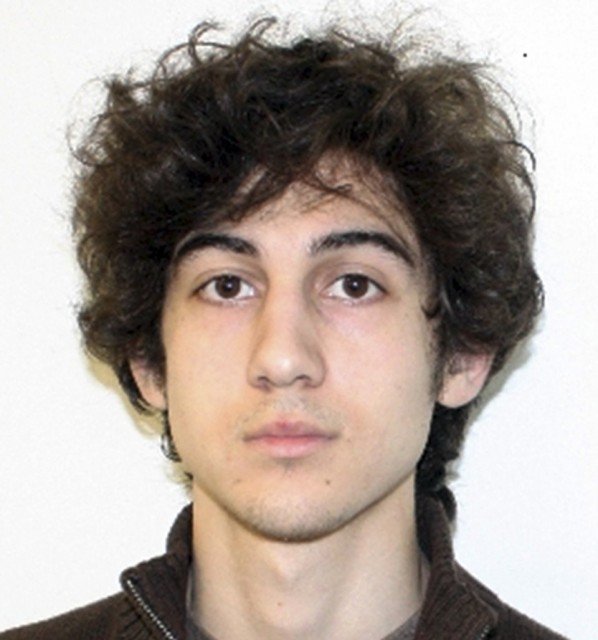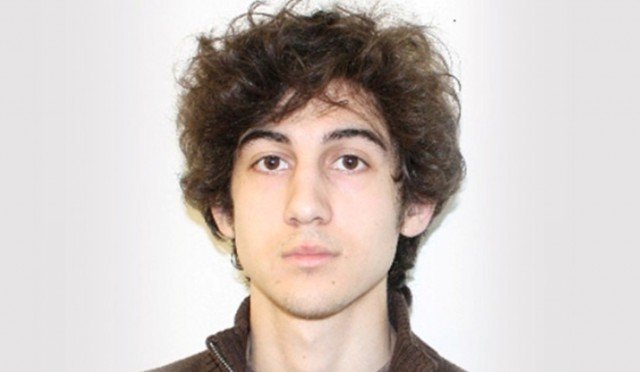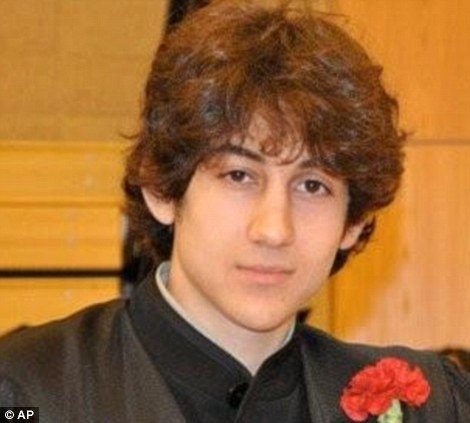Home Tags Posts tagged with "beth israel deaconess medical center"
beth israel deaconess medical center
Boston bombing suspect Dzhokhar Tsarnaev was shot through the face, legs and left hand before his capture, according to newly unsealed court documents.
Despite his injuries, Dhozkhar Tsarnaev was able to “respond vocally” to questioning, Dr. Stephen Odom said several days after the bombings.
The twin bombs at the finishing line of the Boston Marathon on April 15 killed three and injured more than 260.
Dzhokhar Tsarnaev, 19, has pleaded not guilty to the charges against him.
He was found hiding inside a boat in a backyard garden after a two-day Boston-area manhunt.
The other suspect, his 26-year-old brother Tamerlan Tsarnaev, was killed during a shootout with police the night before.
Dr. Stephen Odom, a trauma surgeon who treated Dzhokhar Tsarnaev after his capture by heavily armed police, testified at a hearing at Beth Israel Deaconess Medical Center on April 22.

Dzhokhar Tsarnaev was shot through the face, legs and left hand before his capture, according to newly unsealed court documents
He told court officials that the worst of Dzhokhar Tsarnaev’s injuries was a gunshot wound from a bullet that entered through his mouth and exited the left side of his face.
“This was a high-powered injury that has resulted in skull-base fracture, with injuries to the middle ear, the skull base, the lateral portion of his C1 vertebrae, with a significant soft-tissue injury, as well as injury to the pharynx, the mouth, and a small vascular injury that’s been treated,” Dr. Stephen Odom explained, according to the transcript unsealed on Monday.
Dzhokhar Tsarnaev also had multiple gunshot wounds elsewhere, including his legs and his left hand.
By the time Dr. Stephen Odom testified, the 19-year-old had had multiple medical procedures.
The doctor said despite his injuries and ongoing treatment with the painkiller Dilaudid, Dzhokhar Tsarnaev knew where he was and that he was receiving medical treatment.
“He knows that he has had multiple procedures, but I’m not sure how aware he is of the specifics,” Dr. Stephen Odom told the court.
“He knows that he has an injury to the neck and to the hand.”
Dzhokhar Tsarnaev appeared in court on July 10, with his face swollen and his arm in a cast.
Among the charges he faces are 30 counts of using a weapon of mass destruction. Prosecutors could press for the death penalty.
Dzhokhar Tsarnaev has also been charged over the death of a fourth person, a university police officer allegedly shot dead by Dzhokhar and his brother Tamerlan in the days after the attack.
[youtube FVjTf_En6R4]
The nurses who treated Dzhokhar Tsarnaev have told how they could not stop themselves from soothing him with the words: “I am really sorry, hon.”
Medical staff said that just like any other patient they were reflexively affectionate to Dzhokhar Tsarnaev they “did not see as a terrorist”.
Torn by a mixture of emotions, they made a pact to be unemotional around him as they struggled to reconcile their professional obligations with personal disgust.
Interviews with the nurse show how hard it was to treat somebody who has been accused of being behind the bombings that went off during the Boston Marathon last month.
The explosions left three dead and more than 265 injured, some of whom were taken to the Beth Israel Deaconess Medical Center where 19-year-old Dzhokhar Tsarnaev ended up too after being caught in a shootout with police that killed his brother 26-year-old Tamerlan.
There the nurses found their requirement to treat anybody regardless of their background was tested to the absolute limit.
Speaking to the Boston Globe, seven of the women spoke about caring for him but did not want to give their full names for fear of a backlash from the community.
While moving Dzhokhar Tsarnaev one day a nurse called Irene found herself saying: “I am really sorry, hon.”
She and another nurse called Marie agreed to tell each other if they were using terms of endearment towards him by accident.

The nurses who treated Dzhokhar Tsarnaev have told how they could not stop themselves from soothing him
Marie said: “You see a hurt 19-year-old and you can’t help but feel sorry for him.”
She added that she would “not be upset if he (Dzhokhar Tsarnaev) got the death penalty”.
Marie said: “There is no way to reconcile the two different feelings.”
The night Dzhokhar Tsarnaev was brought in would have been particularly vexing for Beth Israel as doctors were still looking after 24 bombing victims, some of whom were on the same floor as the suspect.
Victims’ families had to walk past an area with armed guards where the man who allegedly maimed their relatives was being held, just so they could see their loved ones.
Nurse Julie Benbenishty, director of trauma at the hospital, said: “Many of the support staff, the cleaners, and families of other patients will say: <<Why are you giving him pain medication?>>
“They might be angry at us for turning him and washing him and for doing what we are really supposed to do.
“After about a half-hour, I don’t see him as a terrorist anymore.”
As the night went on medics were reminded of their obligations under the Hippocratic Oath, and FBI investigators told them: “You need to keep this person alive. We need information. We need justice.”
A 29-year-old nurse said that when she was unsure if she could treat Dzhokhar Tsarnaev, her husband told her: “You have to do it. You have to do it so we can get answers.”
Michele, 29, a nurse who was one of those who cared for Dzhokhar Tsarnaev, said that when she was in the room with him he was “just a patient”.
She said: “You’re here to… make sure they’re feeling better.
“When you step away, you take it in. I am compassionate, that’s what we do. But should I be?
“The rest of the world hates him right now. The emotions are like one big salad, all tossed around.”
[youtube hofyeSIWiCk]
Dzhokhar Tsarnaev has been transferred from hospital to prison, US police say.
The US Marshals Service said the 19-year-old had been moved from the Beth Israel Deaconess Medical Center to a facility at Fort Devens, Massachusetts.
Dzhokhar Tsarnaev has been in hospital since his arrest following a huge police operation a week ago.
He was found badly injured in a boat in a suburban backyard. His brother, Tamerlan Tsarnaev was killed during the manhunt.

Dzhokhar Tsarnaev, whose condition has been described as fair, was taken overnight to the Federal Medical Center Devens some 40 miles west of Boston
Many of the injured have also been treated at the Beth Israel Deaconess Medical Center, and were reported to be unhappy at having the surviving bombing suspect in the same building.
The US Marshals Service said the accused, whose condition has been described as fair, was taken overnight to the Federal Medical Center Devens some 40 miles west of Boston.
The facility, on the decommissioned Fort Devens US Army base, treats federal prisoners and detainees who require specialized long-term medical or mental health care, the Associated Press reports.
Dzhokhar Tsarnaev was charged, by a magistrate at his hospital bedside earlier this week, with using a weapon of mass destruction and malicious destruction of property resulting in death.
He could be sentenced to death if convicted on either count.
Having suffered apparent gunshot wounds to the head, neck, legs and hand, he was reported to have responded to questions in writing because a throat wound left him unable to speak.
The two bombs, placed in pressure cookers and left close to the finishing line of the Boston Marathon on April 15, killed three people and wounded more than 260.
[youtube QGTcUx2XO-8]
Dzhokhar Tsarnaev has been hospitalized in serious but stable condition after his arrest in Watertown and officials say he cannot speak to investigators yet because he has been “intubated and sedated” with a throat wound.
Boston Marathon bomber Dzhokhar Tsarnaev, 19, was found bleeding heavily from gunshot wounds to his neck and foot from the shoot-out on Friday morning, which he escaped on foot before taking up his hiding place in David Henneberry’s backyard boat in Watertown.
The blood loss would have taken place over more than 20 hours by the time he was found and there were reports, which could not be confirmed, that he may have been shot a further two times last night.

Dzhokhar Tsarnaev was found bleeding heavily from gunshot wounds to his neck and foot in David Henneberry’s backyard boat in Watertown
“He had lost a lot of blood. He was so weak that we were able to just go in and scoop him up,” state police spokesman David Procopio told the Boston Herald adding that the suspect was in “serious if not critical condition”.
Dzhokhar Tsarnaev was rushed from the scene by ambulance and images showed apparatus being used to help him breathe.
As the suspect receives treatment at the Beth Israel Deaconess Medical Center in Boston, law enforcement officials have revealed that he injured his throat in the standoff with police and may not be able to speak.
The medical facility where Dzhokhar Tsarnaev is a patient is under heavy armed guard and federal prosecutors are standing by at the center for when the teenager is able to speak.
Victims who were injured in the deadly blast at the Boston Marathon on Monday are also among those being treated at the medical center, which has some families angry about the close proximity to the alleged mastermind.
Dzhokhar Tsarnaev is being treated in a room yards from where 11 injured marathon victims are still in recovery while a specially drawn up High-Value Detainee Interrogation Group wait anxiously to question him.
Dzhokhar Tsarnaev is reportedly “clinging to life” under armed guard in the same hospital where 11 of Boston Marathon bombings victims are still being treated.
The secret service’s leading interrogators are waiting anxiously as doctors at the Beth Israel Deaconess Medical Center fight to save Dzhokhar Tsarnaev, the 19-year-old who murdered three and maimed more than 180 in Monday’s terror attack and killed a police officer on Thursday.
Dzhokhar Tsarnaev was captured last night in the culmination of a dramatic week-long police hunt and a completely unprecedented $333 million shutdown of Boston and its suburbs yesterday.
Massachusetts Governor Deval Patrick said today: “[I] hope he survives, because we have a million questions.”
Meanwhile, his father Anzor Tsarnaev called on him to tell “everything to the police” and to “be honest”.
The families of two of his victims Martin Richards, 8, and Krystal Campbell, 29, said they were glad no one else would be hurt and now they looked for justice.
A political row broke out this morning over how the terror suspect should be treated with the government sanctioning the immediate suspension of his Miranda rights.
Civil rights groups opposed the move while a group of Republicans said the government should suspend all legal rights and treat him as an “enemy combatant”.
Dzhokhar Tsarnaev was said to be “clinging to life” after losing a lot of blood from injuries sustained in Thursday’s shoot-out with police which claimed the life of his brother and accomplice, Tamerlan, 26.

Dzhokhar Tsarnaev is “clinging to life” under armed guard in the same hospital where 11 of Boston Marathon bombings victims are still being treated
Investigations will also look at how Tamerlan Tsarnaev, who is emerging as the clear ringleader of the pair, was previously investigated and freed by the FBI over suspected terror links after being prompted to investigate him by Russia.
There are also questions around how the FBI dismissed posts Tamerlan Tsarnaev made on the internet about terrorism and whether they should have taken his younger brother’s anti-American, 9-11 denial posts more seriously.
Dzhokhar Tsarnaev is being treated in a room yards from where 11 injured marathon victims are still in recovery while a specially drawn up High-Value Detainee Interrogation Group wait anxiously to question him.
Some victims families questioned the authorities decision to try and save Dzhokhar Tsarnaev’s life in the same building where these victims are adjusting to life without limbs and struggling to survive because of his actions.
The hospital was being heavily guarded on Saturday with scores of officers manning the main doors and going in and out of the Boston hospital.
The FBI barred the hospital from commenting on the medical condition of the suspect but they confirmed he was still alive.
Dzhokhar Tsarnaev was found bleeding heavily from gunshot wounds to his neck and foot from Thursday’s shoot-out which he escaped on foot before taking up his hiding place in a Watertown backyard boat.
The blood loss would have taken place over more than 20 hours by the time he was found and there were reports, which could not be confirmed, that he may have been shot a further two times last night.
“He had lost a lot of blood. He was so weak that we were able to just go in and scoop him up,” state police spokesman David Procopio told the Boston Herald adding that the suspect was in “serious if not critical condition”.
Dzhokhar Tsarnaev was rushed from the scene by ambulance and images showed apparatus being used to help him breathe.
Authorities were just relieved to have taken him alive.
[youtube dSchGPPIiqA]
A study in the journal PLoS ONE suggests that some people responding to treatments that have no active ingredients in them may be down to their genes.
The so-called “placebo effect” was examined in 104 patients with irritable bowel syndrome (IBS) in the US.
Those with a particular version of the COMT gene saw an improvement in their health after placebo acupuncture.
The scientists warn that while they hope their findings will be seen in other conditions, more work is needed.
Edzard Ernst, a professor of complementary medicine at the University of Exeter, said: “This is a fascinating but very preliminary result.
“It could solve the age-old question of why some individuals respond to placebo, while others do not.
“And if so, it could impact importantly on clinical practice.
“But we should be cautious – the study was small, we need independent replications, and we need to know whether the phenomenon applies just to IBS or to all diseases.”
The placebo effect is when a patient experiences an improvement in their condition while undergoing an inert treatment such as taking a sugar pill or, in this case, placebo acupuncture, where the patient believes they are receiving acupuncture but a sham device prevents the needles going into their body.
Two groups in the study had this type of treatment. One group received it in a business-like clinical manner and the other from a warm supportive practitioner. A third randomly chosen group received no treatment at all.
After three weeks the patients were asked if they had seen an improvement in their IBS, a common gastrointestinal disease that can cause abdominal pain and discomfort.
The team then used blood samples to look at what variant the individual had of the catechol-O-methyltranferase (COMT) gene. This plays a role in the dopamine pathway, a chemical known to produce a feel-good state.
Paper author Dr. Kathryn Hall, from the Beth Israel Deaconess Medical Center (BIDMC), said this gene had been chosen because “there has been increasing evidence that the neurotransmitter dopamine is activated when people anticipate and respond to placebos”.
The researchers found individuals with a COMT variant that triples the amount of dopamine in the front of the brain felt no improvement without treatment but an improvement with the placebo acupuncture.
Ted Kaptchuk, director of the Program in Placebo Studies and Therapeutic Encounter at BIDMC, said: “We wanted to tease apart the different doses of placebo.
“We got an effect in individuals with this specific genetic signature for the general placebo, but an even bigger effect in the elaborate placebo where warmer care was given.
“You can really see the advantage of a positive doctor-patient relationship.”
Fabrizio Benedetti, professor of neurophysiology at the University of Turin Medical School, Italy, warned that dopamine may not be the only chemical involved with the placebo effect.
“A previous study on the genetics of placebo in social anxiety disorder showed that it is serotonin that is associated to placebo responsiveness and not dopamine,” he said.
“While this is a very interesting work, what we have learned in the past few years is that there is not a single placebo response and a single mechanism, but many, across different medical conditions and therapeutic interventions.”





